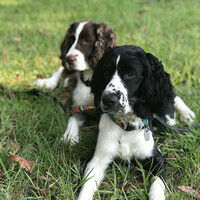Many of us (including me) got our musical start on either piano or guitar. So two things are very natural as we have moved toward film composing - (1) we tend to rely heavily on the instrument we are most comfortable with and (2) we tend to make any other instruments or sounds through our experiences on piano and/or guitar.
So it is quite often a beginner (and I succumbed to this as well when I first started), would first score a cue totally using a piano/keyboard. If it sounded good or there was no time, the score consisted of just the piano/guitar. Or perhaps we would then assign instruments to different 'voices' in each of the stacked notes we played on the piano and/or guitar. And what would result would be an ensemble/orchestral sound that sounded like a piano/guitar that had different 'sounds'. The problem/issue is that 'effective' writing for instrument ensembles require we understand the nuances (such as the various articulations) of the instrument we are writing for and hence we write 'idiomatically' for that instrument. We also learn early on that effective composing means we have to stop writing 'vertically' - i.e., treating instruments and their 'movements' as merely participating in chords - and think of a 'horizontal' movement where each instrument has a part and something to say and contribute.
All that is good and worth a separate discussion but what still begs the question is then what role does the piano or guitar play in all this. For example, even if you are strongest writing for piano and/or guitar, when would you write a cue that leaves them out totally? Or when you use them as part of an ensemble, when do you use them one note at a time and when do you incorporate multiple notes at any instrument. What I have found out for example, is that unless the piano is being featured as the primary melodic instrument with few if any supporting instruments, I rarely use more than 2 notes at a time (often the 6th below such as the E below C for a C major construct). I am have been finding myself using the piano in a supporting role with just a right hand and often 2 notes.
Another thing which is piano specific is the pedal. I used to spend a lot of time determining when to pedal down as the piano played. What I have discovered in the last year or so, is that since my overall sound design for all the instruments uses a certain amount of convolution (i.e., somewhat 'wet' sound) and that using pedaling with the piano tends to 'muddy' the piano sound - especially if the sound editor mixes the score in relatively low. So when I am not soloing the piano, I just don't use pedaling at all now and the piano sounds fine.
So each of us who use a piano and/or guitar has our own way to use it. Here are some questions to consider. When do you feature the piano/guitar? Do you solo with it and if it is supported by other instrumentation, how do you score with the piano/guitar?
Here is one more thing to consider. I'll talk about piano but the guitar has the same issues. Piano and guitars probably have more models and sounds than perhaps any other instrument. And that is true for both actual instruments and electronic instrument samples. So do you have just one or more? And if you have many, then when do you use which one?
For me for example - I probably have 10 to 20 different pianos and perhaps 5 to 10 different guitar sample sets. I do have a 'favorite'. When I first started playing piano again in 2000, I purchased a Yamaha P-80 piano. I always had a preference for that Yamaha sound - it was smooth. Not sharp like say a Steinway, for example. And the Yamaha has become my 'go to' piano for most of my scores though when I want a sharper sound I go with a 'white grand' or a 'Steinway'. Sometimes I need a vintage sound like a 'tack piano' - so I have a bunch of specialty 'period' or 'regional' pianos. There are lots of places to get piano samples from - some are even free. My preferred vendor has been www.sampletekk.com and my piano, the "7CG Jr.".



postscript - having thought about this for the last day, I decided to upgrade from the entry version of Sampletekk's C7 to its full version "7CG MKII for $50 (prices currently 50% off, a full non-upgraded version is $74.50). BTW - They all use the full Kontakt sampler. www.sampletekk.com/grand-pianos&product_id=248
I am a guitar player, but I use the piano just as much. I find the piano is so suited to moving around the melody. At least getting the first notes that I have in my head down. But once I have that, I actually like to work on the articulations of the instrument in question within the melody. I use the guitar for finding my underneath big riffs. The things that the cello or double bass or other instruments will be doing. But then again, it's just as a basis. Afterwards I do try and actually use the articulation of the instrument. As far as go to piano, I almost always use ADDICTIVE KEYS Grand. But I screwed around with it for a while, changing the mic placements and such to get the sound that I wanted. And then of course I love the frozen piano sound. Those are my 2 favorites.
This one submission for HL, I wrote using piano and violin first, after listening to other examples. Playing drums, it was last this time, adding Timpani for added effects within piece.
If I’m doing jazz, lay down basic parts in Logic, then record drum / percussion parts.
Thanks for the horizontal tip; sometimes I am looking vertical for interesting sounds to add within music. Yes, progressions make for better music.